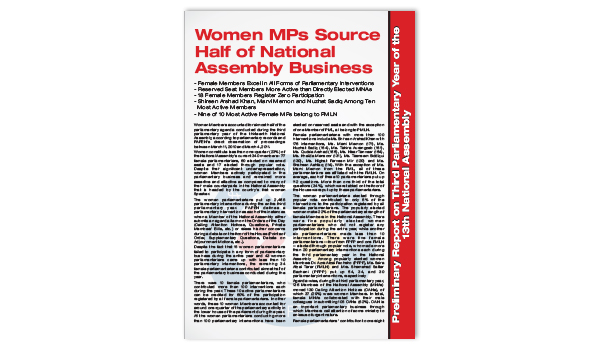 Women Members accounted for almost half of the parliamentary agenda conducted during the third parliamentary year of the thirteenth National Assembly, according to parliamentary records and FAFEN’s direct observation of proceedings between March 11, 2010 and March 4, 2011.
Women Members accounted for almost half of the parliamentary agenda conducted during the third parliamentary year of the thirteenth National Assembly, according to parliamentary records and FAFEN’s direct observation of proceedings between March 11, 2010 and March 4, 2011.
Women constitute less than one-quarter (23%) of the National Assembly’s current 340 members – 77 female parliamentarians, 60 elected on reserved seats and 17 elected through popular vote. Despite their significant underrepresentation, women Members actively participated in the parliamentary business and remained more assertive and effective as compared to many of their male counterparts in the National Assembly that is headed by the country’s first woman Speaker.
The women parliamentarians put up 2,458 parliamentary interventions during the entire third parliamentary year. FAFEN defines a parliamentary intervention as each of the instances when a Member of the National Assembly either submits an agenda item on the Orders of the Day (Calling Attention Notices, Questions, Private Members’ Bills, etc.) or raises his/her concerns during a debate on the floor of the House (Points of Order, Supplementary Questions, Debate on Adjournment Motions, etc.).
Despite the fact that 18 women parliamentarians failed to participate in any form of parliamentary business during the entire year and 43 women parliamentarians came up with less than 10 parliamentary interventions, the remaining 34 female parliamentarians contributed almost half of the parliamentary business conducted during the year.
For complete report click here








